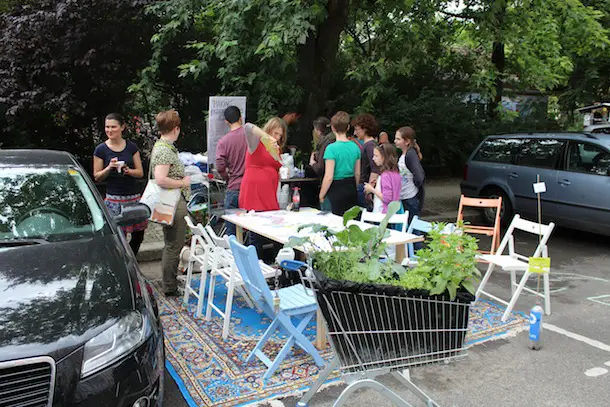Cities the world over constantly try to reinvent their global images. Many try to alter the meanings invoked by uttering the name of their city: Amsterdam’s increasingly iconic ‘I Amsterdam’ campaign was unabashedly called by its own creators (PDF) to be the city’s attempt to engage in a cutthroat global competition for travellers that would change its image from one of the unsavoury tourist destination to one of the luxurious and historical cultural destination.
There are more to these tactics than mere branding strategies, though. Certain cities have transcended their status as a proper noun, a name that signifies a place, in order to become other forms of speech: adjectives, adverbs, nouns, verbs. This isn’t just the name of some urban planning and architectural design technique or some kind of urban markup language: it’s the way we, as humans, valorise a place and give it deeper, more fundamental connotation. In this way, the cities we live in are not simply spaces with a name: they’re places with inscribed meaning.
Berlin: adj.
1. A space that melds together elements of high and vernacular culture
2. A space that combines oppositional elements
3. Synonym for cool
Likely the most common way to make use of city names is to transform them into adjectives. The most recognisable city-turned-adjective is Berlin. With its institutionalised hedonism in an elegantly edgy urban setting, Berlin is the contrasting city non plus ultra, full of innovative space re-use and outside-of-the-box design. Saying something is “so Berlin” recognises a revolutionary use of contrasting elements that makes the contrasts play with one another, rather than stand in stark opposition. That Berlin’s most well-established house and techno club is in a non-descript building that once housed a power plant is perfectly fitting: applying Berlin as an adjective to any space, public or private, suggests the bridging of gaps between high culture and the quotidian.
L.A.: adj.
1. Glitzy, glamorous, opulent
2. Dirty, dangerous, dingy
3. Weird
4. A less-European synonym for cool
Los Angeles is just as much characterised by contrasts as Berlin is, but is an entirely different beast in itself. When one thinks of L.A., two things come to mind: sprawling suburbia and ubiquitous celebrity. The metropolitan area extends across a space larger than Hong Kong, Singapore, Bahrain, and all of the Palestinian territories combined, and is mostly covered in stock suburban neighbourhoods engaged in the stereotypical suburban lifestyle. The few areas that are not completely suburban or completely urban are the playgrounds of the city’s affluent residents. All of this, of course, occurs under the setting of the heavily-romanticised but locally-despised palm trees. Saying that something has an ‘L.A. feel’ gives the place a lot of baggage: it is at once repulsive and alluring, off-putting and inviting, and ultimately a slightly more weird flavour of cool than Berlin.
Brusselise: v.
1. A process of urban densification that lacks planning foresight
2. Maintaining a ‘hands-off’ approach in urban planning
3. Pejorative term for placing buildings in a neighbourhood in which they do not fit
As far as more action-oriented words go, to Brusselise is certainly not a compliment. It’s a pejorative in the strongest sense of the term, really: as the Summer of Love captivated the United States, Brussels witnessed the dawning of an era completely devoid of planning foresight. The result was a phenomenon of modern skyscrapers appearing next to small, two-century-old buildings without rhyme or reason. While strengthened zoning regulations have managed to temper the trend, the word remains a convenient and easy way to criticise planning strategies for, well, not planning. An ironic way for Brussels, the political hub of Europe, to maintain a spot in the burgeoning urban language.
Vancouverise: v.
1. A process of densifying a neighbourhood in a way that mitigates the negative effects of high-density living
2. Consistent implementation of a tower-and-podium architectural typology
3. Planning a city to take advantage of spectacular natural surroundings
Vancouverise, or the verb form of Vancouverism, is an urban planning strategy that has gained a fair amount of global traction in recent years, all the while receiving foreign press coverage and foreign political interest. Cities everywhere are increasingly forced to confront a two-faced dilemma: increasing density on the one hand, while ensuring that it’s liveable and enjoyable for all on the other. The strategy in Vancouver has been to place slim residential towers in the downtown area while trying to ensure contributions to improve street life. To Vancouverise a city isn’t just to increase density with tower-and-podium structures: it’s a practice that attempts to combine this practical urban planning aim with the fuzzier concerns for the quality of public space, be they plazas or sidewalks.
While these are merely a small selection of examples, the growing urban language is not simply the product of city branding campaigns (I doubt the city halls of Los Angeles and Brussels are pleased to know the images that their city names invoke for many). This is indicative of a broader trend of the importance of cities globally. As scores of urban rankings make their claims as to why particular cities are the best in the world, cities themselves need to carve out a unique identity that makes them attractive in ways that are not contrived. This isn’t a time for city branding: this is a time for creating a city that cultivates a positive connotation in the new urban language.
Photo: Eva the Weaver


